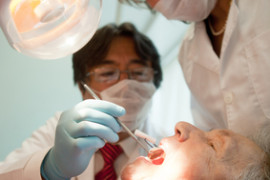In the past few years, the world of oral microbiology has been inundated with new research establishing the connection between bacteria found in the mouth and systemic disease. The same oral pathogens known to play a role in gum disease have also been linked with heart disease, diabetes, rheumatoid arthritis, and stroke, to name a few.
But could these bugs also play a role in the development of cancer?
New research out of the University of Louisville explores the roles two common oral bacteria in particular—Porphyromonas gingivalis and Fusobacterium nucleatum—play in cancer development.
“Both P. gingivalis and F. nucleatum establish chronic infections that involve intracellular persistence within epithelial cells, can spread systemically and cause extra-oral infections, and have well-characterized immune disruptive properties.”
We know from prior research that both P. gingivalis and F. nucleatum can incite an inflammatory response, and P. gingivalis in particular has been shown to affect immune response by turning white blood cells into carriers. These and several other factors, according to researchers, are consistent with the mechanisms behind cancer development.
The big takeaway from this? Researchers in this study concluded: “Improved oral hygiene and treatment of periodontitis may be useful in limiting the development or spread of cancer.”
This study further verifies what we have known for a long time: periodontal disease is not just a dental disease. It is a complex, microbial disease that has serious implications on overall health.
And with 80% of the adult US population suffering from some form of gum disease, this information is not only significant—it’s downright critical. P. gingivalis in particular is extremely common. In fact, recent studies completed by OralDNA labs concluded that 70% of American adults age 40 and up have P. gingivalis levels above threshold, putting them at serious risk for health complications.
There isn’t a single person that doesn’t fear a cancer diagnosis, and for good reason. This new information is not only a key piece to the oral-systemic puzzle but also an eye-opening part of awareness.
Source: Oral Bacteria and Cancer



